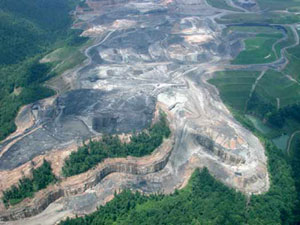In what they are calling the biggest civil penalty in history under the Clean Water Act, the EPA and Department of Justice are crowing about settling with Alpha Natural Resources for a $27.5 million fine, plus $200 million for cleanup.
No wonder coal companies aren’t afraid to break the law. In this case, Alpha, the third largest coal company, has almost 6300 violations where pollution from mountaintop mining spewed uncontrolled into streams and rivers.
Alpha, which bought Massey Energy, will spend $200 million to install and
operate wastewater treatment systems and to implement comprehensive, system-wide upgrades to reduce discharges of pollution from coal mines in Kentucky, Pennsylvania, Tennessee, Virginia, and West Virginia. There are 79 active mines and 25 processing plants in these five states.

"This settlement is the result of state and federal agencies working together to protect local communities from pollution by enforcing the law," says Cynthia Giles, Assistant Administrator of EPA’s Office of Enforcement and Compliance Assurance. "By requiring reforms and a robust compliance program, we are helping to ensure coal mining in Appalachia follows environmental laws that
protect public health."
Local environmental groups see it differently. "Once again, the federal government has taken action because the West Virginia Department of Environmental Protection (DEP) failed to enforce the law," says Vernon Haltom, Executive Director of Coal River Mountain Watch. "We’ve recently experienced the devastation of 300,000 residents’ water supply as a result of DEP’s failure to take action. Unfortunately, regulators will continue to grant permits to coal companies that are in violation of their existing permits.
Clearly, mountaintop removal operations cannot comply with the law, and this practice needs to end now."
How about preventing the problem from occurring in the first place?
"While it’s important that Alpha pays for its violations, EPA is still failing at its most important job; ensuring pollution like this doesn’t happen in the first place," says Mary Anne Hitt, Director of Sierra Club’s Beyond Coal Campaign. "If we’ve learned anything from the coal chemical spill in West Virginia and the coal ash spill in North Carolina, it’s that strong, pro-active up front enforcement of our clean water protections is paramount."
Alpha also has to develop and implement an environmental
management system and conduct periodic internal and third-party environmental compliance audits. They have to maintain a database that tracks violations and compliance efforts at each place where they discharge pollutants into waterways.
"The unprecedented size of the civil penalty in this settlement sends a strong deterrent message to others in this industry that such egregious violations of the nation’s Clean Water Act will not be tolerated," says Robert Dreher, Acting Assistant Attorney General for the Justice Department’s Environment and
Natural Resources Division.
Really? $27 million is a strong deterrent?
EPA has documented at least 6,289 violations of permit limits for
pollutants at 794 different discharge points. Many discharges were more than double the amount allowed under permits on multiple occasions, and some exceeded permits by as much as 35 times the legal limit. The company failed to properly operate treatment systems or even bother installing them in many places.
For Alpha, this slap on the wrist, barely registers, says Jim Sconyers of Sierra Club’s West Virginia Chapter. "To them, it’s just one more cost of doing business, and they can afford it. The only lesson they’ll respect is if EPA and the WV Department of Environmental Protection refuse to give them permits."
And, guess what? Alpha CEO Kevin Crutchfield and President Paul Vining are both getting $2 million bonuses!
Not surprisingly, another coal company, Armstrong Coal, had the nerve to sue an employee when he filed a safety complaint with federal regulators. He fought back and after finally returning to work, the company is making his life miserable because he continues to raise red flags about safety concerns at a Kentucky mine. They went so far as to hire someone to watch him during work.
One reason these coal companies have been getting away with these violations is that because of the Sequester, litigation positions have been cut. Three offices that have been litigating 10,700 mine safety cases have been downsized or shut down.
